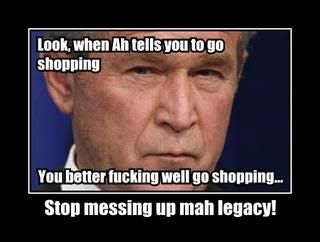
Dalton McGuinty, much like the Dubya before him, has urged his constituents to hit the malls.
Many people are "feeling the pinch" during the current downturn and are worried about their jobs and savings, he acknowledged.Obviously, the opposition has some objections to this recommendation, particularly NDP leader Howard Hampton.But if they refrain from buying holiday gifts, for example, they could "unwittingly" add to Ontario's economic troubles, McGuinty said.
"I know we've got to take steps at home and we've got to be prudent and we've got to be careful and that's understandable," he said after visiting a pharmaceutical firm in Pickering, east of Toronto.
"But if you don't buy that car -- even though you can actually afford it -- if you don't buy that fridge, if you don't shop at Christmas time, it can actually put us in a bit of a downward spiral."
The criticism is hardly unwarranted, but it's also off-base. Under the current economic system, the only way to get out of a recession, or to slow the onset of one, is to spend. We need everyone rowing in the same direction, or growth stalls. The way we've got things wet up, a stall means a downturn. Growth, constant and without limits, is the only measure of economic stability, let alone success.Opposition parties pounced on McGuinty's remarks as further evidence the premier is "out of touch" with ordinary people who fear they'll soon have to join the unemployment line.
The premier's advice is "just as crass and bizarre" as U.S. President George W. Bush telling Americans to "get out there and shop" after the terrorist attacks of Sept. 11, 2001, said NDP Leader Howard Hampton.
Hampton's right, in that people facing layoffs or pay cuts and rising interest rates need to keep their eyes on the future. But he's missing the bigger picture. McGuinty's advice, like Bush's after 9/11, is economically sound. What Hampton, and most of the rest of his critics, I'm sure, will miss, is that this recession is another symptom of a system that is fundamentally flawed.
Our current economic system is flawed in several key ways:
- It relies on a prosperity gap that is untenable, and also unpleasant, so we've done our best to send poverty overseas, and have done a helluva job.
- It fails to recognise the natural limits of a finite planet.
- It has been artificially sustained for nearly two centuries, by government support, the distortion of the market by advertising, the ghettoization of two thirds of the planet, and the artificial savings granted by cheap petroleum.





No comments:
Post a Comment